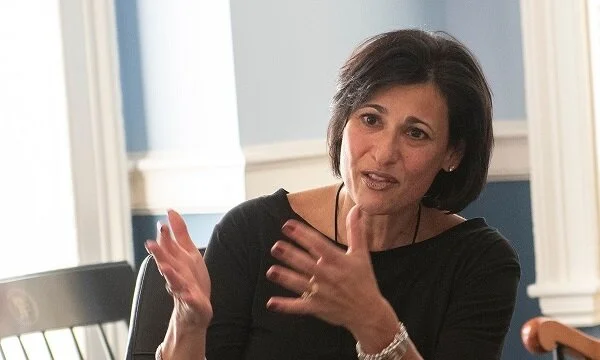Joan E Greve & Richard Luscombe
Dr Rochelle Walensky, the CDC director, notes new US cases are now at about 70,000 a day
The US faces “impending doom” from a resurgent coronavirus pandemic, the head of the federal Centers for Disease Control and Prevention (CDC) warned on Monday.
“Right now I’m scared,” Rochelle Walensky said in an emotional and unscripted moment during a White House briefing.
“I’m speaking not necessarily as your CDC director, and not only as your CDC director, but as a wife, as a mother, as a daughter to ask you to just please hold on a while longer.”
Walensky aired her concerns the same day a new CDC study provided “strong evidence” that the two mRNA vaccines approved for use in the US, produced by Pfizer-BioNTech and Moderna, are highly effective in preventing infections in what the agency called “real-world conditions” among healthcare personnel, first-responders and essential workers.
“This study shows that our national vaccination efforts are working,” Walensky said. “These findings should offer hope to the millions of Americans receiving Covid-19 vaccines each day and to those who will have the opportunity to roll up their sleeves and get vaccinated in the weeks ahead.”
Later, Joe Biden announced that 90% of US adults would be eligible to be vaccinated by 19 April, with twice as many pharmacies authorized to administer shots.
In New York, Governor Andrew Cuomo announced that the state would begin vaccinating people aged 30 and older on Tuesday, and would make all adult residents eligible from 6 April.
Nonetheless, many experts fear a fourth wave of Covid-19 in the US as variants of the deadly virus continue to circulate in numerous states, many of which have almost fully reopened, and Americans prepare for the summer travel season.
And while Biden’s news offered some optimism, the president also warned the battle against Covid-19 was not over yet. “We still are in a war with this deadly virus, and we’re bolstering our defense, but this war is far from won.”
Despite more than 2.5m vaccinations being administered per day and a shrinking death toll, Walensky believes a fourth wave is imminent.
“I’m going to lose the script, and I’m going to reflect on the recurring feeling I have of impending doom,” she said. “We have so much to look forward to, so much promise and potential of where we are, and so much reason for hope. But right now I’m scared.”
Walensky’s concern appears to be backed up by statistics. The US recently passed 30m cases of Covid-19, according to Johns Hopkins University, and the seven-day average of hospital admissions has risen to 4,800, up 200.
The daily average of new cases has also risen, by 10% in a week, to about 70,000, far higher than the 40,000 to 50,000 daily cases of a few weeks ago.
According to Johns Hopkins, 549,364 Americans have died of coronavirus.
“We do not have the luxury of inaction,” Walensky said, pleading with Americans to continue to wear masks and maintain social distancing. “I’m asking you please hold on a little while longer.”
The CDC vaccines study, conducted in six states from December to March, showed risk of infection was reduced by 90% two weeks after a participant received a second dose, and by 80% two weeks after their initial shot.
The figures mirrored those reported by vaccine manufacturers after clinical trials, which led to the US Food and Drug Administration (FDA) granting emergency use authorisations.
Elsewhere on Monday, the New York Times and other outlets reported that it had obtained a leaked copy of a World Health Organization (WHO) report suggesting the coronavirus most likely originated in bats before spreading to humans through another animal.
The origin of the pandemic has become a political football with some, including Dr Robert Redfield, a former director of the CDC, suggesting without evidence the virus escaped a laboratory in Wuhan, China.
The WHO report, set for official release on Tuesday, discounts that claim as “highly unlikely”, the Times said, citing “a team of experts” that recently visited Wuhan.
Also on Monday, the CDC confirmed it was extending until 30 June a nationwide moratorium on evictions for renters affected financially by the pandemic. The current protection had been scheduled to lapse on Wednesday.

